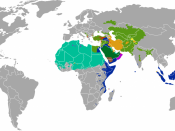One of the greatest economic difficulties faced by Muslims is that of riba, or interest. Muslims are prohibited by Islam to deal in interest. This creates a massive dilemma for Muslims that want to adhere to their religion while successfully participating in the current economic world. There have been multiple propositions to this dilemma. Some of these propositions have gone in to practice and others are currently being molded. Islamic Banking has become a dynamic scene where Economists and Islamic scholars have begun collaborating to give Muslims a contemporary answer on the place of interest.
The fundamental need is to understand why interest is prohibited. After learning why interest is prohibited one will learn how to work around it. Islamic jurists have given several reasons why interest has been prohibited in Islam. One of the most popular views is that of Imam Ghazali. The reason he says interest is prohibited is because money is a means to value commodities.
To generate money off of money is against the very nature of money, according to him. He explains it best:One who practices usury on dirhams and dinars is denying the bounty of God and is a transgressor, for these coins are created for other purposes and are not needed for themselves. When someone is trading in dirhams and dinars themselves, he is making them as his goal, which is contrary to their functions. Money is not created to earn money, and doing so is a transgression. The two kinds of money are means to acquire other things; they are not meant for themselves. In relation to other goods, dirhams and dinars are like prepositions in a sentenceÃÂused to give proper meaning to words; or like a mirror reflecting colors but having no color of its own. If a person is permitted...


